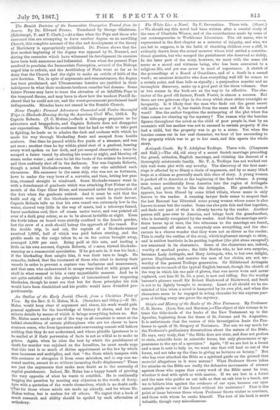The White Lie: a Novel. By F. Devonshire. Three vols.
(Skeet.) —We should say this novel had been written after a careful study of the case of Charlotte Winsor, and of the contributions made by some of our contemporaries to Workhouse Literature. The old nurse, who is represented in the first chapter as a monster of iniquity, and who, we- are led to suppose, is in the habit of chucking children over a cliff, is. evidently drawn from the actual monster whose trial settled a constitu- tional question, but who escaped the punishment she deserved so richly. In the later part of the story, however, we meet with the same old nurse as a moral and virtuous being, who has been converted to a religions life, and yet was never in need of repentance. A sketch of the proceedings at a Board of Guardians, and of a death in a casual ward ; an amateur detective who does everything well till he comes to a certain point, and then fails as signally ; a purposeless murder and an incomplete discovery, make up a good part of the three volumes.' One' or two scenes in the book are on the way to be effective. The cha- racter of the good old farmer, Frank Foster, is almost a success. But there are two grievous slips in the story which show either oversight or- incapacity. Is it likely that the man who finds out the great secret will make no use of it, but vanish from the scene and die in a casual ward? Has the author forgotten the mainspring of the plot when the- time comes for clearing up the mystery? The reason why the heroine figures throughout the novel as the child of poor people is, that by an eccentric will her mother was not to succeed to certain property if she- had a child, but the property was to go to a sister. Yet when the- heroine comes out in her real character, we hear of her succeeding to the property which was to go to her aunt, and this upsets the whole, story.






























 Previous page
Previous page